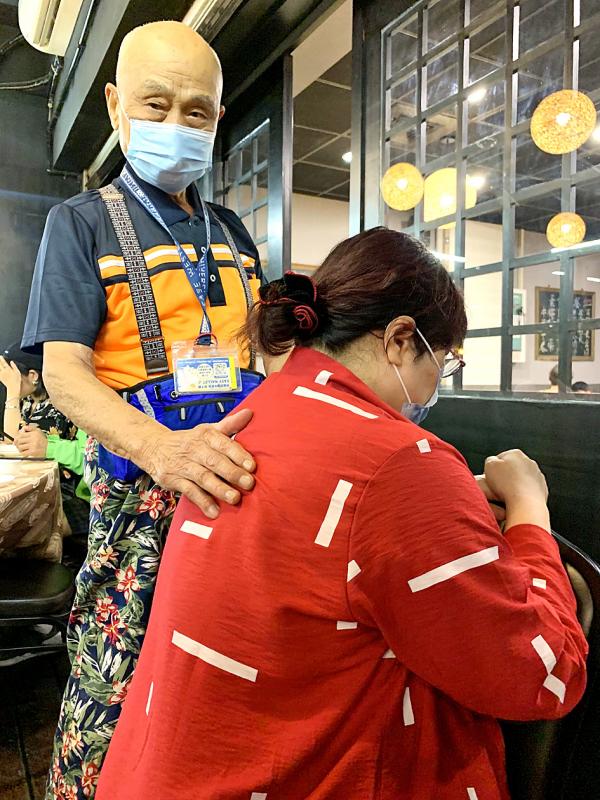At 96 years old, Lien Chin-ting (連金廷) has become the nation’s oldest licensed caregiver.
“I am old, so I know better how to care for old people,” he said on Friday, as he demonstrated how to care for a bedridden patient.
At the encouragement of his daughter, Lien said he often attends activities at an elderly-care center in Taichung.

Photo: Tsai Shu-yuan, Taipei Times
However, it was not the classes that sparked his interest, but rather the work of caregiving itself, he said.
In January, he began a 97-hour course that includes 52 hours of coursework, eight hours of practical work and 30 hours of clinical practice.
After completing his courses and a written examination, he received his caregiver license last month and now volunteers at the same center that inspired his journey.
As he himself is of an advanced age, Lien said he would never charge for his services.
Lien retired at 70, but leads an active life, going on hikes, serving as a certified Taoist cleric, and taking classes in Japanese and other subjects.
“My dad has never stopped learning and exercising,” his daughter said. “He really has no issues physically.”
This new chapter is not too big of a change, as Lien cared for his wife before she died about eight years ago and often helps with his grandchildren.
He is now studying other aspects of professional caregiving, such as nutrition, and has obtained cardiopulmonary resuscitation certification, he added.
“Now I can care for others as well as myself,” he said.

The Ministry of the Interior (MOI) is to tighten rules for candidates running for public office, requiring them to declare that they do not hold a Chinese household registration or passport, and that they possess no other foreign citizenship. The requirement was set out in a draft amendment to the Enforcement Rules of the Public Officials Election and Recall Act (公職人員選舉罷免法 ) released by the ministry on Thursday. Under the proposal, candidates would need to make the declaration when submitting their registration forms, which would be published in the official election bulletin. The move follows the removal of several elected officials who were

The Republic of China (ROC) is celebrating its 114th Double Ten National Day today, featuring military parades and a variety of performances and speeches in front of the Presidential Office in Taipei. The Taiwan Taiko Association opened the celebrations with a 100-drummer performance, including young percussionists. As per tradition, an air force Mirage 2000 fighter jet flew over the Presidential Office as a part of the performance. The Honor Guards of the ROC and its marching band also heralded in a military parade. Students from Taichung's Shin Min High School then followed with a colorful performance using floral imagery to represent Taiwan's alternate name

FOUR DESIGNATED AREAS: Notices were issued for live-fire exercises in waters south and northwest of Penghu, northeast of Keelung and west of Kaohsiung, they said The military is planning three major annual exercises across the army, navy and air force this month, with the navy’s “Hai Chiang” (海強, “Sea Strong”) drills running from today through Thursday, the Ministry of National Defense said yesterday. The Hai Chiang exercise, which is to take place in waters surrounding Taiwan, would feature P-3C Orion maritime patrol aircraft and S-70C anti-submarine helicopters, the ministry said, adding that the drills aim to bolster the nation’s offshore defensive capabilities. China has intensified military and psychological pressure against Taiwan, repeatedly sending warplanes and vessels into areas near the nation’s air defense identification zone and across

A Chinese takeover of Taiwan would severely threaten the national security of the US, Japan, the Philippines and other nations, while global economic losses could reach US$10 trillion, National Security Council Deputy Secretary-General Lin Fei-fan (林飛帆) wrote in an article published yesterday in Foreign Affairs. “The future of Taiwan is not merely a regional concern; it is a test of whether the international order can withstand the pressure of authoritarian expansionism,” Lin wrote in the article titled “Taiwan’s Plan for Peace Through Strength — How Investments in Resilience Can Deter Beijing.” Chinese President Xi Jinping’s (習近平) intent to take Taiwan by force